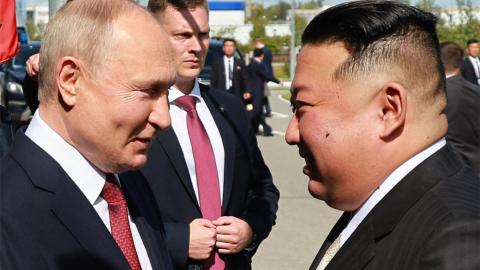Military cooperation between Russia and North Korea is an under-appreciated enabler of Vladimir Putin’s war of aggression against Ukraine. Beyond the shipment of military equipment, the Moscow-Pyongyang axis threatens peace in Asia and internationally. Unless the United States, South Korea, and like-minded allies and partners stand firmly against the malign actions of these revisionist powers, we should expect new obstacles to our shared objectives and further deterioration to world order.
It is easy for analysts to dismiss the value of North Korean ammunition. Even a million artillery shells represent little more than a month’s wartime use of ordnance by the Russian army. But when Russia’s tired military industry struggles to produce 2 million artillery shells a year, every additional million rounds help keep Russian forces in the fight and on the offensive.
The flow of covert ammunition to Putin’s fighters was undoubtedly even more valuable last year when the Wagner Group competed with the Russian Army for military equipment. After the group’s former leader, Yevgeny Prigozhin, rebelled over the lack of Russian army support for his frontline forces, Putin found a way to unify his military command. Still, if you don't think that matters, ask the brave Ukrainians locked in a desperate battle for their nation’s survival.
Beyond the physical contribution to Russia’s aggression, North Korea’s unbridled support for Moscow’s war effort lends essential political and psychological influence. The intangible benefits would be less significant were North Korean constancy not starkly contrasting the voices of those members of Congress opposed to the defense of freedom and the provision of arms urgently needed for Ukraine's self-defense.
That is why every container of North Korean military equipment and ammunition shipped to Russia and sent by train to the European front reinforces Putin’s determination to win the war he started. He sticks around and waits for a reversal of fortune created not by a brilliant Russian performance on the battlefield but by our desultory behavior and lack of steadfastness when confronting a persistently grave threat.
Whatever the realities, even the appearance of Russia-North Korea and Russia-China-North Korea-Iran collusion amplifies a revisionist global security agenda antithetical to our interests and values. When a second conflict saps our political influence and allows our adversaries to exploit a situation, as we see now in the Middle East, we should remember the limits of power and never underestimate our adversaries.
We also should be vigilant regarding what Russia may provide North Korea. Although the Kim regime should be forever grateful for Moscow’s decisive role in establishing the DPRK, both powers are practitioners of realpolitik. Moscow feels no great compunction to reciprocate North Korea’s largesse in the form of military equipment, but both Moscow and Pyongyang long for greater influence and are happy to play the role of disrupters.
Throughout the decades, Russia has supported North Korea’s missile development while impeding its grandest ambitions for a nuclear buildup. The possibility that Russia recently offered the decisive technical guidance to help North Korea launch a military satellite into space after two embarrassing failures could make the beginning of a new and more ominous chapter of strategic cooperation — cooperation that could undermine security on the peninsula and in Northeast Asia, not just in the Western portion of Eurasia.
And the possibility that the Kim regime will use Russia’s support for its defenses to extract new concessions from China — gifts for de-escalating and preserving stability — also means North Korea will be sticking around to build still larger nuclear-armed missile forces that threaten our allies and the American homeland. So, the knock-on effects of North Korea’s support for Russia’s war in Ukraine must also be seen as another negative implication.
As a black belt in Judo, Putin appreciates the ability to turn an opponent’s strength into his weakness. So it is today that Russia, North Korea, and Iran — which all looked troubled last year — are finding reasons for optimism. We, too, must pull together at home, and with allies and partners, to demonstrate the viability and desirability of democracy, freedom and a rules-based international order.
North Korea’s military support for war in Ukraine should encourage our South Korean ally to find new ways to assert itself as a global pivotal state consistent with the Yoon administration’s forward-looking National Security Strategy.
Likewise, the axis of revisionist powers should bolster trilateral cooperation among the United States, South Korea and Japan as they build on the spirit of Camp David and demonstrate their resolve to be pillars of peace and security, not just in the Indo-Pacific but also as NATO A-P4 partners.
The Russia-North Korea security axis should also reinforce our understanding that security in Europe and Asia is indeed indivisible.


















